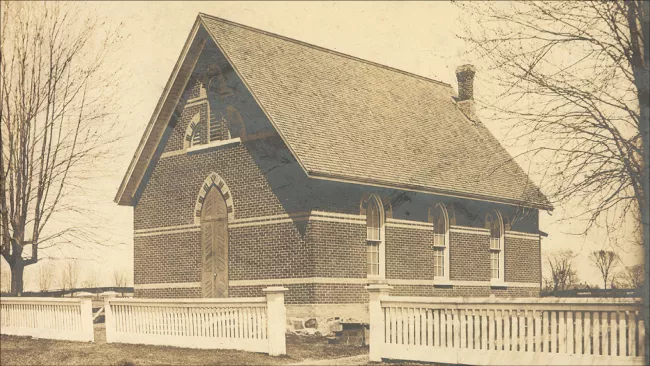From the Archives: The Concord Methodist Church
The City of Vaughan’s archives house more than 600 collections dating from the early 1700s to the present day. Within these files are the stories of how Vaughan evolved from the traditional territories of the First Peoples of Turtle Island to the bustling city it has become.
Let’s look back at our history and share the stories of the people, places and moments that helped shape the city we know today. This month’s feature is on the Concord Methodist Church.
The Concord Methodist Church, originally known as White Church or Bowes Church, was located at the corner of William Bowes’ farm at Bathurst Street and Dufferin Street, north of Centre Street. The earliest records from this congregation date back to 1840; however, it likely started even earlier. The church was renamed Concord Methodist Church following the union of the Methodist churches in 1883.
The Concord Methodist Church originally formed part of the Yonge Street circuit – which spanned the neighbourhoods of Willowdale to the east, Concord and Sherwood Park in the centre, the Town of Weston to the west and King City to the north – serving a variety of churches in what was then York Township (now part of the City of Toronto). The congregations came together once every three months for a quarterly meeting. Two ministers staffed the churches in the Yonge Street circuit – a married man who was paid about $500 annually and a single man who received about $250 per year.
At the time, money was scarce, and ministers often received at least part of their salary from the congregations in “table expenses,” which included food for them and their animals and other essentials, such as wood and tallow (a type of rendered animal fat) for candles. For example, a congregation might have provided a minister with an annual four barrels of flour, 300 pounds of pork, 40 pounds of sugar, 10 pounds of tallow, 15 bushels of potatoes, half a barrel of salt, four pounds of tea, two tons of hay, 40 bushels of oats and 20 pounds of lard.
As ministers travelled from church to church, they relied on stewards to ensure the services went smoothly. Common duties of stewards included greeting attendees of the church, helping to distribute the Holy Communion, counting tithes or offerings and ensuring the minister was cared for when they arrived. During the union of the Methodist churches, the stewards in Concord were Isaac Reaman, William Bowes and George Reaman. George Reaman also acted as the recording steward (who was tasked with keeping records of activities and information) for the church until he left in 1906.
Following the 1883 union of the Wesleyan, Episcopal, Primitive and British sections of the Methodist churches, the Concord Methodist Church became part of the Maple circuit. The Maple circuit was comprised of the communities of Hope, Carrville, Edgeley and Concord.
In 1886, a brick church was built to provide a meeting place for the congregation in the village of Concord, which was located at today’s intersection of Dufferin Street and Highway 7. This served them until the 1930s, when it was sold and became a private residence. The building was demolished in 1988.
VIEW VAUGHAN'S ARCHIVES ONLINE!
Looking for more information about the history of Vaughan? The City's Archival Collection is on digital display for all to explore! The below galleries are available in the City's online gallery on Flickr:
- From Township to City: The Evolution of Vaughan
- Historical Families of Vaughan
- Historical Photography
- Past Mayors of Vaughan
- Prohibition in Vaughan
- Recollections of Rural Vaughan
- The Great Depression in Vaughan
- The Mary Wood Collection
- The Way We Were: Representations of Vaughan's Past
- Vaughan’s Forgotten Heroes
- Vaughan Lodge Fonds
- Vaughan Working Environments
- Vaughan Through the Ages: Medicine, Music and Sports and Recreation
- And more!
A personal Flickr account is not required to access the City's online gallery, which contains only a small selection of the full archives collection. If you are looking for a particular image, original file, primary source record or more, please visit the Archival Database or contact the City by calling 905-832-2281 or emailing archives@vaughan.ca.
By managing and preserving both City and community records, the City’s Enterprise Information Management Services team ensures that Vaughan's rich and varied history will continue to be available for future generations. Learn more at vaughan.ca/archives.
For the latest updates, subscribe to Vaughan News and follow the official corporate channels on X, Facebook, Instagram and LinkedIn.





